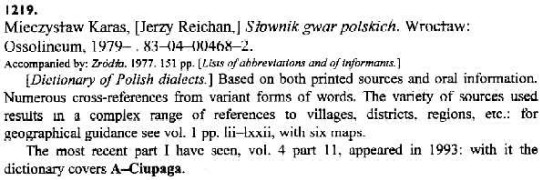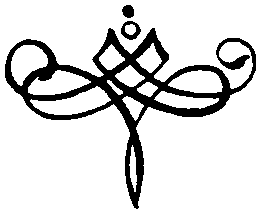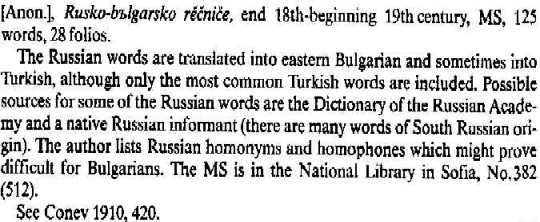
Sources for Dictionaries and Language Resources
A guide to world language dictionaries
Dalby, Andrew. Chicago: Fitzroy Dearborn Publishers, 1998.
U of I Library Call Number: Main Reference Collection and Oak Street Facility 016.413 D15g

While a highly selective source, this annotated bibliography is a rich compilation of the World’s dictionaries. The compiler has sought to include those dictionaries that have retained their importance for scholarly research despite their age. Titles included here document the vocabulary they list, they include word origins, cite sources of information. The compiler has also included tables providing the alphabetical order for each language. Entries are arranged alphabetically, cross-references are indicated in small capitals. Each language section opens with a description of where the language is spoken, the approximate number of speakers, the language family and a listing of other closely related languages. Those languages with more than 6 dictionary entries have a subject arrangement: “Historical dictionaries”; “The modern standard”; “Older periods”; “Regional forms”; “Slang and special vocabularies”; “Etymological dictionaries.” The example pictured here is taken from the Polish section on Regional forms.The volume includes an index of names and titles.

The Slavonic languages
Comrie, Bernard and Greville G. Corbett. New York: Routledge, 1993
U of I Library Call Number: International & Area Studies General Slavic Reference (Slavic) and Main Stacks 491.8 Sl1633
This is a general guide to the Slavonic languages with an emphasis on their linguistic features. For those looking for a general introduction to these languages this is a very good source and includes a basic bibliography on each language. For each language there is a transliteration table. All languages have introductory sections, a discussion of phonology, a section on morphology, one on syntax, another on vocabulary and a final discussion on dialects.
For those beginning research in an unfamiliar language this can be a very useful source. Certainly, it is one that librarians can find very helpful when having to work with Slavic languages that are outside their main area of expertise.

Grammars and dictionaries of the Slavic languages from the Middle Ages up to 1850. An annotated bibliography
Stankiewicz, Edward. New York: Mouton Publishers, 1984. 190 p.
U of I Library Call Number: International & Area Studies General Slavic Reference (Slavic) and Oak Street Facility 016.4918 St2g
For those working on linguistic questions or texts that date from the middle ages through the first half of the 19th century, this is an excellent guide to that most essential of reference works, the dictionary. The work also serves as a history of grammatical study in the West and East for the period. Stankiewicz has included grammars and dictionaries for Czech, Slovak, Polish, Serbian, Bulgarian, Croatian, Serbian, Slovene, Russian and Ukrainian. The entries are grouped into regional sections for West, South and East Slavic. Within each of these sections the references are separated into sections on grammars and dictionaries. The entries tend to have concise annotations and the volume is liberally cross-referenced (see below). The volume includes a lengthy secondary bibliography organized by language. There is an index of authors and a list of cities with variant name.

Stankewicz, Edward Grammars and dictionaries of the Slavic languages from the Middle Ages up to 1850. p.72

Bibliographie der Worterbucher
Warszaw: Wydawnictwa naukowo-techniczne. 1961-1981.
U of I Library Call Number: International & Area Studies General Slavic Reference (Slavic) and Main Stacks 016.03 B471; U of I holds the following: V.1 1945-1961, V.5:1969-1970, V.6:1971-1972, V.7:1973-1974, V.8: 1975-1976, v.9,:1977-1978.
This bibliography of Slavic dictionaries has one of the more unusual structures you will find in a bibliographic resource. The volumes are divided into two main parts, single-language dictionaries and multi-language dictionaries. These parts have entries organized by universal Dewey number with a two letter code for the language/languages used in the dictionary. The entries are not annotated. It is listed here as it covers some years not listed in Lewanski and thus provides a single source for identifying dictionaries. As with Lewanski the sources included are terminological dictionaries, encyclopedias, and more standard dictionaries.
Bibliography of Slavic dictionaries
Lewanski, Richard C. Bologna: Editrice Compositori, 1972, V.1-4. (Part of World bibliography of dictionaries.)
U of I Library Call Number: International & Area Studies General Slavic Reference (Slavic) 016.4918 L58b 1972 V.1-4
This is a source with a variety of uses. The most obvious is as a reference guide to the published dictionaries for the region. The four volumes are arranged by country, beginning with volume one devoted completely to Poland. The dictionaries included are not just language resources. Lewanski has included biographical dictionaries, encyclopedias, dictionaries, even some bibliographic sources such as Mezer’s Slovarnyi ukazatel po knigovedeniiu (1924) thus it provides access to a number of different types of sources.
The first volume on Poland was intended as a single study Polish language dictionaries. The coverage of this language is, to some extent, more complete than those represented in the other volumes. Volume two is devoted to general Slavic dictionaries, Belorussian, Bulgarian, Czech, Kashubian, Lusatian, Polabian, Macedonian, Old Church Slavic, Serbocroatian, Slovak, Slovenian, and Ukrainian. Each section is followed by its own author, language and subject index. Volume three is devoted to Russian and the final volume updates the sources in the previous three volumes.
Lewanski’s set is a very good starting point. However, the scholar should be aware that the absence of any annotation makes it difficult to find some of the more valuable resources. A case in point is the Slovar’ sovremennogo russkogo literaturnogo iazyka published by the Academy of Sciences. This is a valuable resource for identifying quotations, as well as tracing the origins of terms to their original literary usage. Using this source effectively presupposes at least a basic knowledge of the titles you are seeking as opposed to a subject interest.

Languages-on-the-web
URL: www.lonweb.org/
This is a very useful site for a wide range of sources on the languages of the world which is searchable by country. Along with dictionaries and grammars there are sites on culture, television, radio, newspapers, software, translators, schools and “interesting sites.” Every entry is annotated, most very briefly.
This is a good broad based site for anyone looking for information on languages. There is also a useful section at the bottom of the home page on other useful language sites. If you should not find what you need at this site, you will likely find it on one of those listed in this section.
